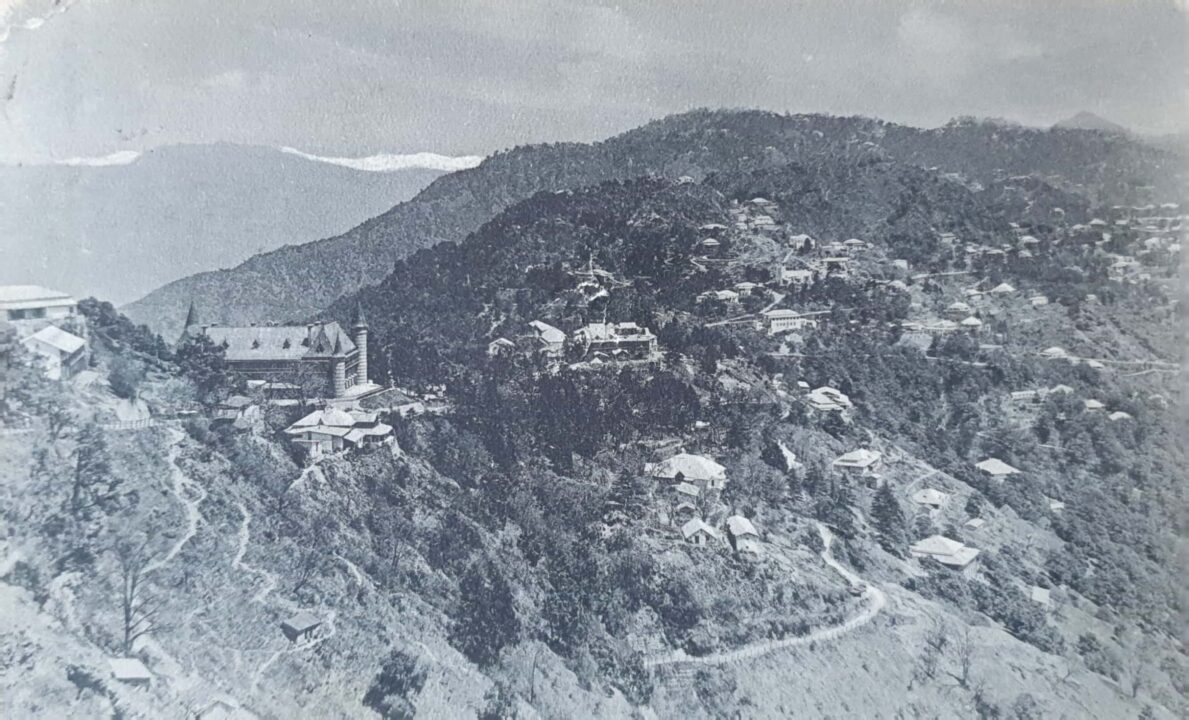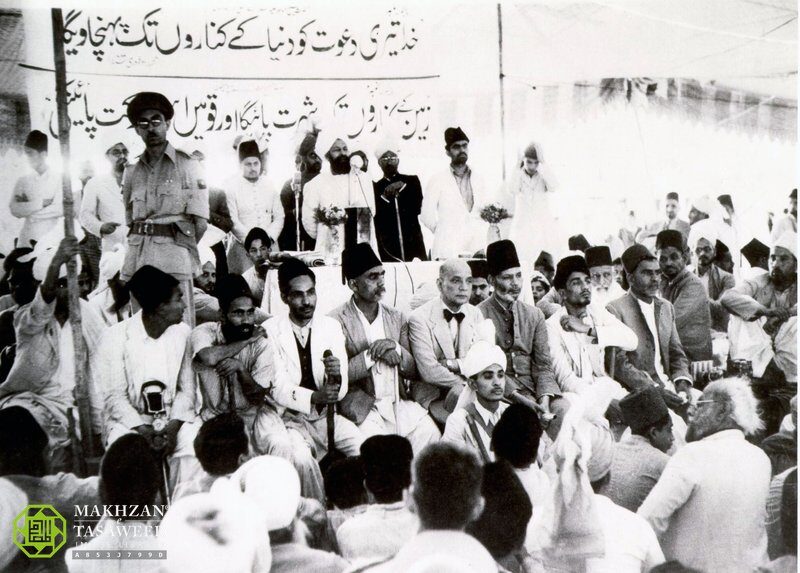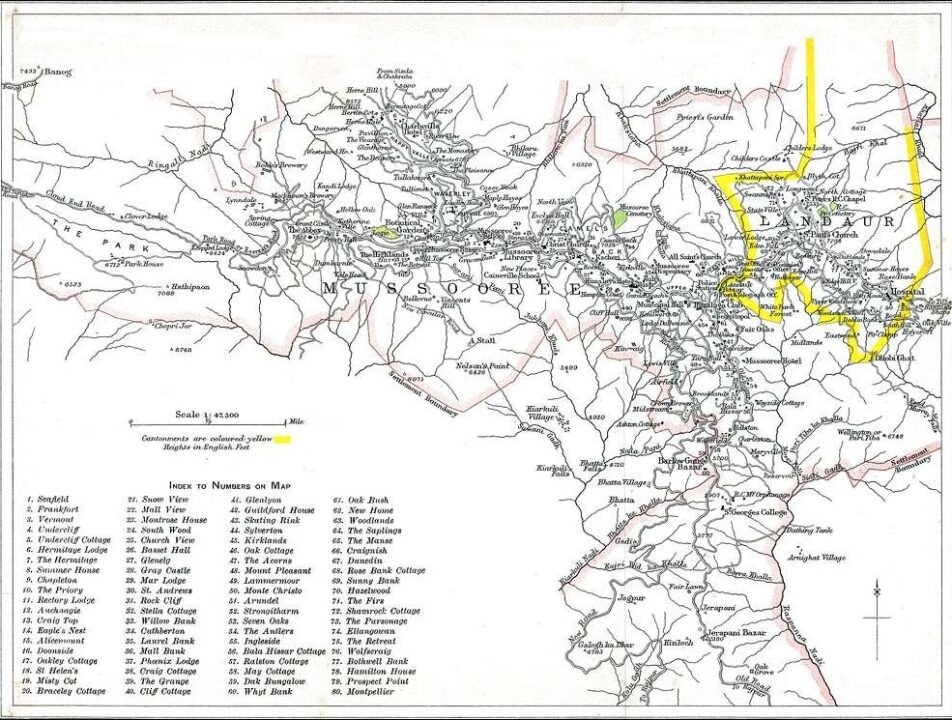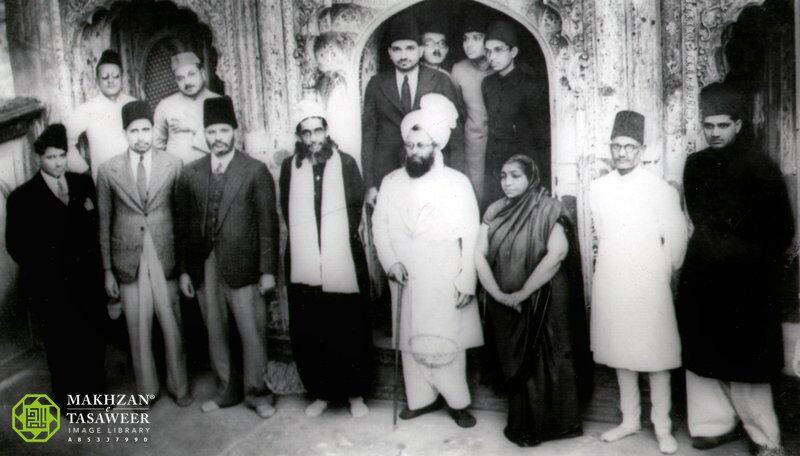Ata-ul-Haye Nasir, Al Hakam

On 19 April 1931, Hazrat Musleh-e-Maud, Mirza Bashir-ud-Deen Mahmood Ahmadra departed from Qadian for a visit to Mussoorie, also known as Mansuri, which is a town in the Dehradun district of the Indian state Uttarakhand. (Al Fazl, 19 April 1931, p. 1)
Friday Sermon in Mussoorie
During his stay in Mussoorie, Huzoorra delivered the Friday Sermon on 24 April 1931, and said:
“Allah the Almighty granted certain distinctive features to different things, and with respect to those features, they attain a certain status; even in some instances, places and locations also attain superiority and precedence over the others. […] Today, while coming to this mosque, a thought came to my mind that Mussoorie also holds a special superiority; that is, this is the only mountainous area in India where Ahmadis have their own mosque. The [Ahmadiyya Muslim] Jamaat is established in Shimla, however, it does not have its own mosque. The Jamaat is present in Darjeeling, however, there too, the Jamaat does not have any mosques. The members of our Jamaat visit Dalhousie as well, but Ahmadis have no mosque there either. However, there is a mosque at this place [Mussoorie], and for this reason, the responsibilities of this jamaat have also increased, since populating the mosque is also essential. The responsibility of this jamaat to populate the mosque and carry out tabligh is greater than in other mountainous areas. The House of Allah the Almighty always expands. The Promised Messiahas would often say that the House of God always expands.
“I believe that if the members of our Jamaat make efforts to populate the Ahmadiyya Mosque of Mussoorie, then the perfect reflections [azlal] of this mosque would be established in the surrounding areas as well, [i.e., that some other mosques will also be built]. […] It is quite possible that Allah the Almighty blesses the sincerity of the [Ahmadi] people here and as a perfect reflection of this mosque, Ahmadi mosques may be established in the surrounding places. […] I find that whichever jamaats have built mosques in their cities with sincerity, have made progress as well. However, it is essential that the mosques should not be [built] in order to show off. The remembrance of Allah the Almighty with utmost humility and meekness is far better than their apparent beauty. […]
“The sincerity with which the [Ahmadi] people here have built this mosque, will certainly be a source of blessings, and if they carry out tabligh with the intention that Allah the Almighty may fill this mosque with worshippers, then I hope that their tabligh with this intention will be even more blessed. […] Thus, I hope that if the members here make a resolve to populate this mosque, occupy in prayers [du‘a], and carry out tabligh with great passion, keeping in mind [the need for] populating this mosque, then it is very possible that Allah the Almighty may bless their sincerity and make this place superior to the other places.
“The mountains are a means for the firmness of the earth, and from this very aspect, prophets have also been called ‘mountains’, and jibaal (pl.) also denotes the religious scholars. Hence, mountains hold a connection with the prophets and scholars. Along with this spiritual connection, the mountains now hold a physical connection with the divine communities as well. Now, our way of life has become such that a great number of well-known members of the Indian population gather at these mountains during the summer.
“If our jamaats strengthen in such mountainous areas, then we can carry out tabligh to certain people of India. It is very difficult for us to visit the whole of Bengal; however, certain people of Bengal could be preached to in Darjeeling. Tabligh can be carried out in the whole of Punjab province by strengthening the jamaats in Shimla, Murree, and Dalhousie. In the same way, if the system of tabligh is strong enough in Kashmir, then we can carry out tabligh to the whole of India since people from all over India visit there. In short, by strengthening the jamaats at some of the mountainous places, avenues could open for the tabligh in the whole of India.
“I pray that Allah the Almighty may increase the level of sincerity of our members here. If, due to any weakness or shortcoming, the tabligh is not effectively being carried out, then may He remove the hurdles. Moreover, may He create means at such other places where the tabligh could be effective for a certain province or the whole country.” (Khutbat-e-Mahmud, Vol. 13, pp. 146-149)

A lecture at Mussoorie’s town hall
On 26 April 1931, Hazrat Musleh-e-Maudra delivered a lecture at Mussoorie’s town hall. Prior to this event, various non-Ahmadi Muslim and non-Muslim dignitaries had published pamphlets in Urdu, English and Hindi that stated:
“It is our good fortune that Hazrat Mirza Bashir-ud-Deen Mahmood Ahmad Sahib, Imam Jamaat-e-Ahmadiyya Qadian, is currently on a visit to Mussoorie. He will deliver an insightful speech on India’s progress and the essential means for that progress, namely Hindu-Muslim unity. All of the well-wishers of the country and nation are requested, without any discrimination of religion or community, to come to the town hall on 26 April 1931 and benefit from the lecture of Mirza Sahib.” (Al Fazl, 2 May 1931, p. 1)
The venue was filled with attendees at the fixed time, and the session was presided over by Kanwar Haji Ismail Ali Khan Sahib, a member of the Legislative Assembly.
During his lecture, Hazrat Musleh-e-Maudra said that there are three important factors that cause Hindu-Muslim unrest and halt any chance of conciliation: religious differences, cultural differences between various communities, and political differences.
In regards to the religious differences, Huzoorra said:
“The meaning of tolerance has never been understood correctly. For this reason, various disputes occur on the occasion of religious festivals. For instance, disputes arise on the occasion of Eid, Dussehra, and Muharram.” (Ibid., p. 2)
Huzoorra continued by saying that the followers of a certain religion hold no right to compel the people of other faiths to refrain from anything that is prohibited in their own religion. He said:
“Adopting such measures fuels communal unrest, and we find hundreds of examples where the unrest intensifies [due to such acts]. […] In religious disputes, people often ignore the moral obligations that are, in fact, naturally incumbent upon all, and hence, they do not respect the religious leaders and national heroes of each other, but rather, they disrespect them. In this way, they [attempt to] portray the past of a community as dark and tarnish their future. We ought to provide space to each other to let them build the foundations for national stature, as to enable all communities to build up their national stature on those foundations. And for a certain community, that foundation is its past. The Hindus disrespect Aurangzeb [Alamgir] and the Muslims disrespect the famous national heroes of the Hindus, which flames the hatred. [The attempt] to portray a certain community’s past as dark, darkens its future as well, and that community is unable to progress.
“The third point in this relation is that people severely dislike the tabligh [preaching] of others, and consider it to be a huge attack. Whereas our behaviour should be to listen to each other’s views, and a community should invite another community to get to know about their views. However, it is necessary for that community to narrate the distinctive features of its religion, instead of pointing out the flaws of the other, because there is no benefit in narrating the flaws of a community and it cannot prove their own religion to be perfect. In short, it should be a mutual agreement to listen to each other’s views, which will help in establishing peace.
“Keeping in mind the same point, I had initiated the scheme of ‘All Prophets Day’ in the shape of the Seerat-un-Nabi Jalsas [in June 1928]. It has been acknowledged that the only way to foster love between the communities is for them to respect each other’s holy personages.
“One of the biggest cultural reasons that cause disputes between Hindus and Muslims is ‘untouchability’ [discrimination against people belonging to certain social groups]. […]
“In relation to the political differences, I wish to give one piece of advice to both my Muslim and Hindu brethren. I would advise the Hindus that you hold a majority in this country, so if you give some concession [in terms of rights] to the Muslims, it will not have any impact on your majority. Moreover, I would advise the Muslims to assure this matter, and alleviate the doubts of Hindu people in this regard, that in case of any foreign attack [on India] – no matter if it is from their Muslim brethren – you will strive shoulder-to-shoulder along with the Hindus for the country’s freedom.” (Ibid.)
Towards the end, Huzoorra said that after a thorough contemplation, he had concluded that the conciliation between Hindus and Muslims was still possible, provided they all realised their duties and responsibilities. (Ibid.)

Visit to Dehradun and Delhi
On 30 April 1931, Huzoorra departed from Mussoorie for a visit to Dehradun, and from there, Huzoorra proceeded to Delhi, which he reached on the evening of 2 May. (Al Fazl, 5 and 7 May 1931)
A lecture at the Islamia School in Dehradun
On 1 May 1931, Hazrat Musleh-e-Maudra delivered a lecture during a public jalsa, at the Islamia School in Dehradun, presided over by Khan Bahadur Zill-e-Hussain Sahib, Honourary Magistrate, and the event was attended by people from various religions. During his lecture, Huzoorra shed light on Hindu-Muslim relations, the need for conciliation, and the reasons behind their disputes. The lecture lasted for around two hours. (Al Fazl, 5 May 1931, p. 1)
Address to Ahmadis in Delhi
In Delhi, Huzoorra addressed a gathering held by the local jamaat. During his speech in Delhi, Huzoorra said:
“The jamaat of Delhi is among those jamaats who make their utmost efforts to utilise all those means through which the Jamaat can leap towards progress. The one who strives in the way of Allah the Almighty with sincerity, achieves the desired result for sure. It is not possible for one to not see the result of their efforts despite offering sacrifices of wealth, time, and comfort for the sake of Allah the Almighty. The Holy Prophetsa has stated that Allah the Almighty says that ‘I treat a person in accordance with the relationship that he maintains with Me.’ Thus, though their endeavours might seem insignificant to the eyes of the worldly people, they do not go to waste in the sight of God. However, it is essential for one to keep trust in God, and along with their efforts, they are required to put complete trust in God. Then, Allah the Almighty also manifests His Powers in an unprecedented manner. […] The fact is that the one who puts trust in God, can never presume for the divine works to be fruitless.
“[In 1905], I was a child when the Promised Messiahas visited Delhi [Tarikh-e-Ahmadiyyat, Vol. 2, pp. 422-428]. He visited there the tombs of auliya-Allah [saints], performed very lengthy prayers [du‘a], and said that ‘The reason why I prayed here is that the souls of these saints may rejuvenate, for fear that their progenies may not be deprived of recognising that nur [divine light] which has been sent by Allah the Almighty for their guidance.’ He further said that ‘Surely, a time will come when Allah the Almighty will open up their hearts and they will accept the truth.’ Though I was young at the time, the impression of this saying of the Promised Messiahas is still firm in my heart. Thus, if this jamaat [of Delhi] desires to see a pious outcome of its endeavours, it is required to put trust in God. Certainly, a time will come when that will surely happen, which God desires to establish.” (Al Fazl, 4 June 1931, p. 6)
Huzoorra then mentioned the following kashf [divine vision] of the Promised Messiahas which he saw in 1874, about which Huzooras himself said:
“In a dream, I was shown a long ditch running for miles, on the edge of which thousands of sheep were laid out with their heads hanging over the edge of the ditch, so that when they were slaughtered their blood would flow into the ditch. The rest of their bodies were outside the ditch. The ditch ran East to West and the sheep had been laid on the edge of the ditch from the South. Each sheep was attended by a butcher and every butcher had a knife in his hand, which was placed at the neck of the sheep. The butchers were looking towards the sky as if awaiting the divine command. I found myself walking in the plain to the North and felt that the butchers were angels who were ready to slaughter the sheep as soon as they received the command from above. I approached them and recited the following verse of the Holy Quran:
قُلۡ مَا يَعۡبَؤُا بِكُمۡ رَبِّيۡ لَوۡلَا دُعَآؤُكُمۡ
“Meaning that ‘Say to the disbelievers: “But for your prayer to Him my Lord would not care for you.”’ [Surah al-Furqan, Ch. 25: V. 78]
“The moment I said this, the angels understood that they had been granted permission, as if the words of my mouth were a divine command. Thereupon the angels ran their knives through the necks of the sheep and the sheep began to flutter in a painful manner. The angels severed all the arteries of the necks of the sheep saying: What are you: nothing but refuse-eating sheep.” (Tadhkirah [English], pp. 24-25)
Hazrat Musleh-e-Maudra continued:
“Thus, if one does not pay heed [to God], then why would God care about them? His works cannot stop, they will surely occur. Who could have thought at the time of the Holy Prophet’ssa advent that he would achieve such progress? Christianity attained progress 300 years after the Messiahas of Nazareth, however, seeing our situation, we find that Ahmadiyyat will achieve progress way earlier than the [time taken by the followers of the] Messiahas of Nazareth.” (Ibid.)
Mentioning the efforts of those Muslims who spread the message of Islam in different parts of the world, Huzoorra said:
“They reached Iran, went to China, in short, they reached the corners of the world and wherever they went, they overcame the scholars [of other faiths] there. It was the nur [divine light] that was granted to them by God, and wherever they went carrying this nur, God granted them success. […]
“I advise you that until every one of you becomes a ‘muballigh’ [preacher], no other muballigh can ever be of your avail. […] So, every one of you is required to become a ‘muballigh’, and to foster a connection with God Almighty. […] Thus, you ought to instil such pious reformation within you that the world should feel it. Your situation should be such that witnessing your righteousness, purity, acceptance of prayers, and connection with Allah, people may incline towards it [Islam Ahmadiyyat]. Remember, the progress of Ahmadiyyat will take place through these very people.” (Ibid.)
Visit to the tomb of Hazrat Nizamuddin Auliyarh
On 5 May 1931, Hazrat Musleh-e-Maudra visited the tomb of Hazrat Nizamuddin Auliyarh. (Al Fazl, 9 May 1931, p. 1)
Khawaja Hassan Nizami meets with Huzoorra
During this visit, a renowned Muslim scholar, Khawaja Hassan Nizami Sahib, the then editor of the newspaper Munadi, also had the opportunity to meet with Hazrat Musleh-e-Maudra. (Tarikh-e-Ahmadiyyat, Vol. 5, p. 274)
In regards to this meeting, Khawaja Sahib said:
“Wahidi Sahib was also present when I met with the Imam of Jamaat-e-Ahmadiyya, respected Mirza Bashir-ud-Deen Mahmood Ahmad Sahib. He is 42 years of age. When I met him for the first time, he had no beard, and had come along with his father [the Promised Messiahas] to visit the dargah [tomb of Hazrat Nizamuddin Auliyarh]. […] He is 12 years younger than me. […] His simplicity had greatly impressed me, and my heart felt a sense of respect for him. The discussion revolved around current affairs. He supports the separate electorates.” (Saalnama Munadi 1936, pp. 169-170)

Return to Qadian
Hazrat Musleh-e-Maudra returned to Qadian on 14 May 1931. (Al Fazl, 16 May 1931, p. 1)

